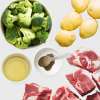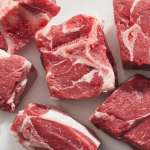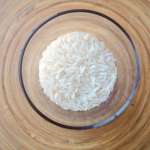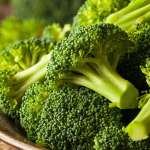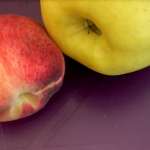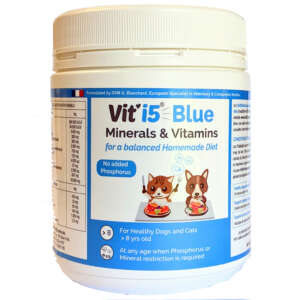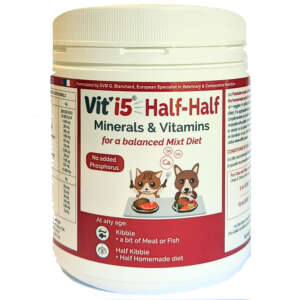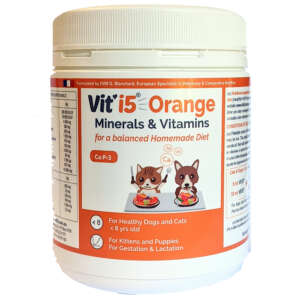Homemade food for a puppy recipe example
Homemade food for a puppy (30kg once grown up)


home prepared recipe for a puppy
Recipe for homemade food for a puppy
(grown up weight 30kg)
home prepared recipe for a puppy

- Meat (600 gr in total)
LAMB LEAN MEAT (boneless shoulder, use human grade meat)
AND BEEF lean MEAT (steak or 5%fat mince)
300 grams
300 grams
30 ml
- Oil
CANOLA OIL or SOYBEAN OIL (Keep the bottle in the fridge)
30 ml
- Vegetables
CARROTS or BROCOLIS
300 grams
- Carbohydrates
WHITE RICE (weight dry – cooked weight is 4 times the raw weight – boil twice the label cooking time )
or SWEET POTATO / POTATO (skinless, boiled in water, must be cooked enough to be easily mashed)
100 grams
400 grams
Adjust the amount of food delivered daily, but keep the same proportions of all ingredients listed here, in order to keep the diet balanced.
The homemade recipe for a puppy can be the same (all ingredients and proportions) during all growth, but the amount of food is not the same at all time.
Homemade diet: easy preparation, storage and distribution
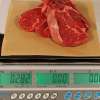
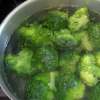
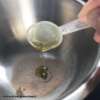
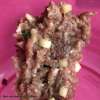
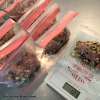
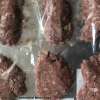
1- Weigh all ingredients raw, or as mentionned in the recipe
2- Chop and cook vegetables and meat/fish
If using canned vegetables, only strained and rinse.
If used fresh or frozen vegetables, cook them in salted boiling water, until mashable. Add the meat/fish filet for the last 5 minutes of cooking.
3- Prepare the mixture
First, mix the small ingredients, then add the cooked ones.
Mix the Vit’i5 powder + Canola or Soybean Oil + Salt/Wheat bran if any in the recipe.
Add cooked vegetables and meat/fish. Mix all ingredients until the mixture is homogenous.
4- Storage, preservation & feeding
If any in the recipe, cooked carbohydrates, such as oat flakes or rice or potato, must not be frozen/thamw : cook them on the day of distribution, and add to the freshly made or defrost mixture.
- Prepared and distributed the same day?
Cook the carbohydrates with the vegetables, This mixture can be used for the day.
The portion left for the other meals of the day can be stored in the fridge for 24 hours. - Prepared for later?
The mixture can be frozen in daily portions. It can be frozen for up to 4 weeks.
Each portion can be thaw in the fridge the day before the day of distribution.
The carbohydrate must be cooked on the day of distribution and mixed with the thawed portion of food.
This mixture can be used for the day. The portion left for the other meals of the day can be stored in the fridge for 24 hours.
5- Split the daily amount in 2 – 3 meals
Give the first meal freshly prepared, or a meal from the fridge.
Do not fry pan, microwave oven or oven heat: you can heat a meal by mixing with a bit of warm water.
The recipe for one day can be prepared as described, and ditributed in 2 days instead of 1. The half for the next day shall be stored in the fridge.
The home prepared recipe for a puppy can be the same (all ingredients and proportions) during all growth, but the amount of food is not the same at all time.
You can prepare the recipe as listed and give only a certain amount as indicated below: before becoming a 30kg adult dog…
- At 3 months old, the puppy should weight 8kg and eat about 1237kcal/99gProt, so 3/4er of the following recipe, which means about 800 grams par day.
- Reaching 6 months old, it should weight 20kg, and eat the entire recipe below (about 1200 grams)
- After 8 months old, lower by 10%, and provide about 1kg of the following recipe, until adult.
- Once the adult size is reached, change to a recipe for an adult.
Weight your puppy every week: the weight shall increase, but the body shape shall stay optimal.
In case of neutering before being adult, a special recipe must be calculated. Change the meat for chicken breast only (same total amount of meat). Then ask for tailored recipes from a certified veterinary nutritionist.
In case you feed your puppy Half Commercial (kibble or canned petfood for puppy) and Half Homemade (with the recipe below), use Vit’i5 Half-Half instead of the Vit’i5 Orange, at the same amount to balance the home prepared half of the diet.
Warning
Avoid changing any ingredients without a proper advice.
Changing any ingredient for another may affect the overall composition and balance: for instance, for the same amount, providing a fatter meat/fish will bring more calories from fat (energy) and may increase body weight. Also, different vegetables may bring different amount of calories (energy).
IMPORTANT NOTICE
This homemade food recipe for a puppy is balanced and formulated by a veterinary nutrition specialist for a heathy pet. It is offered for personal use only.
Copyright 2024 @DrGeraldineBLANCHARD, European Specialist in Veterinary and Comparative Nutrition
Tailored recipes are also available on our website.
Nutritional information
WHY SUCH INGREDIENTS?
The homemade food recipe for a puppy contains
Animal Proteins
Meat, muscle meat, and fish filet are a source of animal protein, and provide protein and all amino acids necessary in the diet of dogs.
You can cook meat of fish in order to reach 70°C for a few minutes, as food safety requires to avoid contamination problems (such as bacteria, parasites…).
Different meats and fish filets differ by their composition in water, protein and fat, and energy. So they are not all the same and substitution of one by another must be guided.
Also, some pets find some tastes more interesting/palatable/attractive than others.
Do not replace without considering the composition or asking to your vet or assess the body weight of your pet weekly..
Mineral vitamin supplement
Vit’i5 is a mineral and vitamin supplement formulated by a veterinary nutrition specialist in order to balance a homemade food for a puppy . It provides the micronutrients that are lacking of in the routine dietary components such has meat+oil+vegetables+carbs.
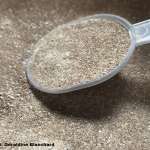
Vit’i5 has to be added to a diet each time it contains fish or meat. It has been designed in 3 products. Vit’i5 may be adapted depending on age and condition, and with the amount of meat/fish each day. It is neither seasonal nor optional.
If the diet is half homemade and half commercial, give Vit’i5 Half-half instead of any Vit’i5 recommended in the homemade recipe. Adjust to the amount of meat or fish filet to keep the same proportions Vit’i5/meat.
Warning:
Do not heat or cook Vit’i5, in order to preserve vitamins
Do not give Vit’i5 if your dog of cat eats only a complete pet food either dry or wet.
Complex carbohydrates (source of energy from Starch)
Starch is the complex carbohydrate contained is pasta, rice, corn, potatoes, tapioca, chick pees, lentils…
It must be cooked (water boiled) to be digestible and become a source of energy. Pets have individual and variable capacity to digest starch, linked to their genetic and epigenetic production potential of alpha-amylase.
Make sure to boil carbohydrates, such as rice or peeled potatoes, TWICE the time it should be for people. That maximises the digestibility of the starch by pets.
Once cooked, DO NOT freeze carbohydrates as freezing-defrosting process decreases the digestibility of starch, and could induce digestive issue such as diarrhea and bloating.
In the recipe, a part of Carbs can also be replaced by other carbs or by treats, to provide an equivalent amount of calories.
Equivalent to 10 grams of raw (dry) OAT FLAKES:
– 10 grams of PASTA or white RICE, cooked
– 40 grams of POTATO or SWEET POTATO, cooked
– 10 grams of any BISCUIT designed for cats
– 5ml (1 spoon) of peanut butter
– 10 grams of Cheese, such as cheddar CHEESE
– 40 grams of Cottage cheese (4%Fat)
– 50 grams of Pure Plain 4%Fat Natural YOGURT (such as Greek or Plain organic yogurt without additional flavours or ingredients)
%Fat Natural YOGURT (such as Greek or Plain organic yogurt without additional flavours or ingredients)
Essential fatty acids
Canola oil, or soybean oil, is a source of essential fatty acids, omega 6 (linoleic acid) and omega 3 (linolenic acid). They may be altered by heat and sunlight.
Don’t heat or cook it, to preserve the fatty acids. Store the bottle in the fridge.
Caps of fish oil may be added to bring also long chain omega 3 fatty acids EPA & DHA, but this does not replace the canola or soybean oil. The fatty acids are different.
Fiber source
Vegetables are a beneficial source of fiber.
In a homemade food recipe for a puppy, give all vegetables cooked, either boiled, or steamed enough to become smooth form. Serve them strained if canned.
Zucchini is a special vegetable that can be given cooked, but can also be cut and frozen raw, and, once defrost, included in the diet without cooking.
You may replace carrots by broccoli, green beans, skinless pumpkin or butternut with the same weight basis. Cookall the vegetabes well enough to be easily cut or mashed.
Last, to offer a bigger amount of vegetables, tou can replace 100 grams of carrots or equivalent by 150 grams of zucchini, tomato, mushroom, asparagus, endives; Cook them well enough to be easily cut or mashed.
Wheat bran can also be used are a source of fiber, along with or instead of vegetable (not in the same amount as wheat bran is dry!). A 2.5ml-spoon in the daily recipe for kitten instead or with vegetables
Treat
FRUITS are usually more appreciated by dogs than cats.
Fruits may represent a treat or a part of the vegetables. Dogs can eat them raw.
Better offer juicy FRUITS such as apple, peach, watermelon, strawberry, pear…
If doing so, stick to the following equivalence: 50 grams of FRESH FRUIT may substitute 50 to 100 grams of CARROT.
(Do not offer banana or dry fruit as a TREAT, they are very rich in energy and can replace carbohydrates)
Please DO NOT REPLACE more than half of the vegetables with fruits as part of fiber source.
For example, in a recipe with 200grams of vegetables, that should not be more that 100 grams (half of 200 grams) of vegetables to be replaced by fruits. Thus so 100/2 = 50 grams of FRUIT such as fresh APPLE in this recipe.
Avoid large amounts of vitamin C-rich fruits such as kiwi fruit, orange… as large amounts of vitamin C would be metabolized in oxalic acid, excreted in urine.
Pets owners can also give DAIRY such as cheese or yogurt. There is no problem with plain yogurt with only milk and ferments in the list of ingredients (avoid the ones with any other component added), and with plain cheese. However be very careful at the amount given, as it brings a lot of calories; 10 grams of cheese brings as much energy as 4 ml of oil or 15 g of raw rice!
BISCUITS also are often proposed. They also brings energy, so limit the amount, and substitute the similar amount (in grams) of raw rice rather than add biscuit to a recipe
All the recipes for pets
Check our recipes main page to browse all of our home made recipes for cats and dogs of all sizes and ages!

